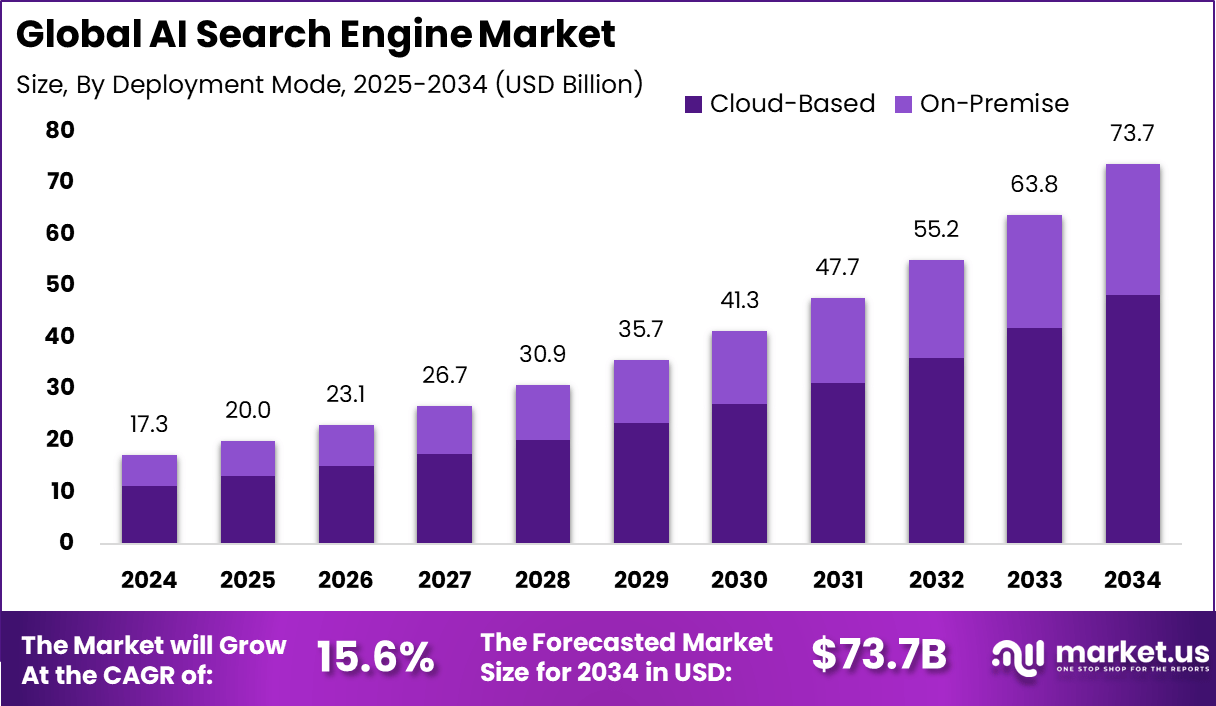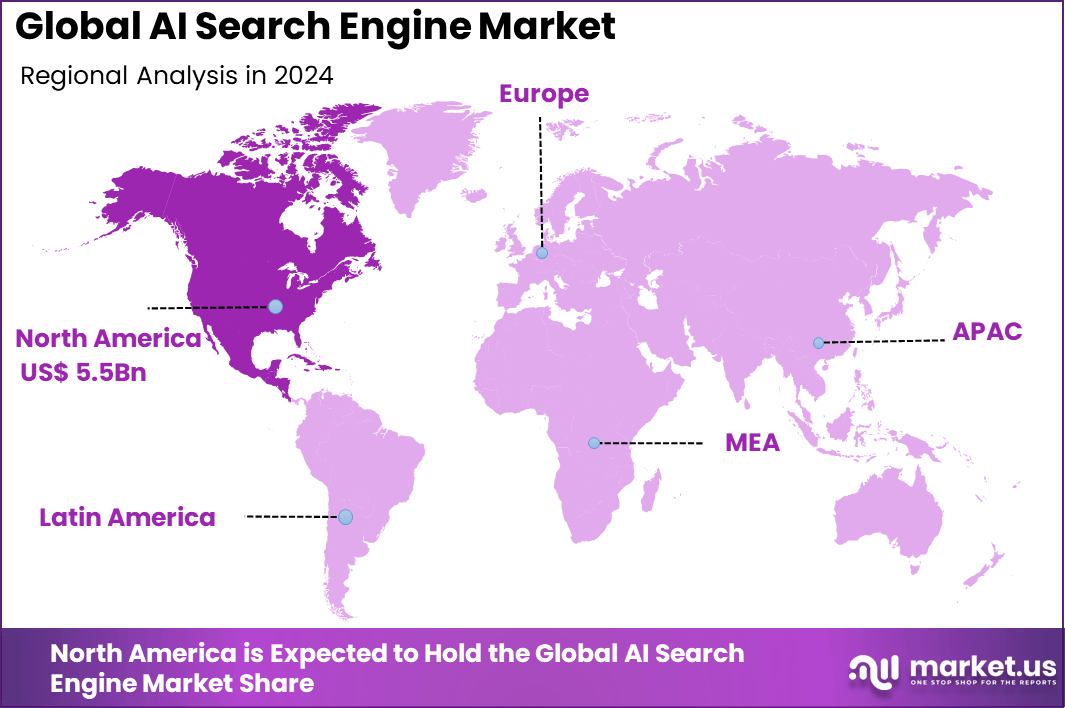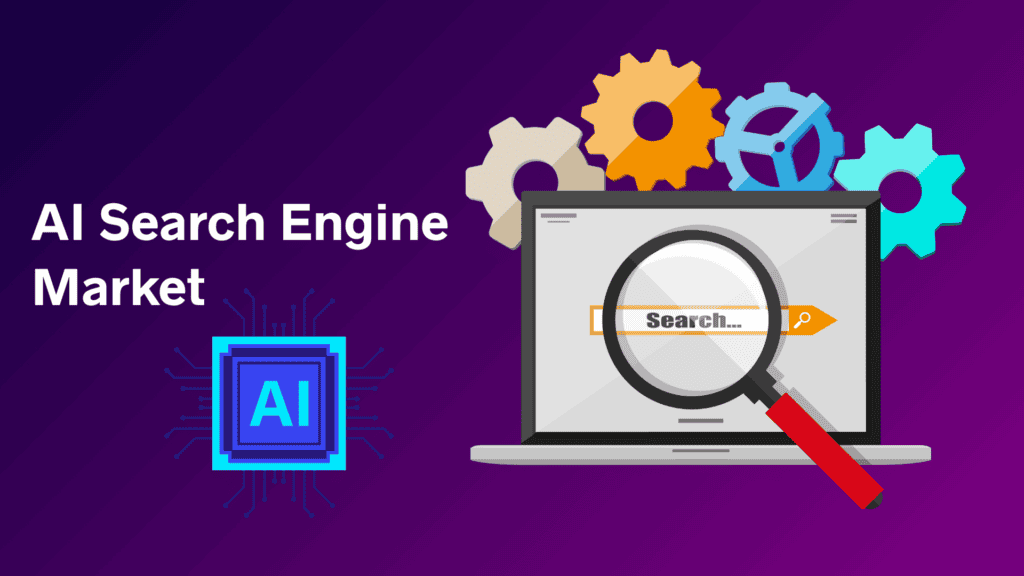Introduction
In 2024, the Global AI Search Engine Market was valued at USD 17.3 billion and is projected to reach nearly USD 73.7 billion by 2034, expanding at a CAGR of 15.6% during 2025–2034. The growth is driven by the increasing integration of generative AI, natural language processing, and voice-enabled search technologies across industries. Organizations are investing heavily in AI-based platforms to enhance search relevance, improve personalization, and support multilingual accessibility, which is accelerating adoption worldwide.
One of the top driving factors behind this market’s growth is the explosion of digital data and the need for intelligent processing to sort through vast volumes efficiently. Users now want search results that are tailored to their unique preferences and context, which AI technologies like deep learning enable. Another important driver is the increased adoption of cloud computing, providing the infrastructure needed to support scalable AI search solutions. The rise of voice assistants and visual search methods also expands how users interact with these search engines, contributing further to demand.
Demand for AI search engines shows significant growth not only among consumers but also enterprises. Consumers rely on AI search for everyday needs such as finding local services or translating languages, while enterprises use AI-powered search tools to quickly access complex data across departments, improving operational efficiency and decision-making. Large enterprises lead adoption due to their need for handling immense data, but smaller companies are catching up through affordable, cloud-based options that streamline customer support and research.

In 2024, about 45% of U.S. adults used AI-powered search engines at least once a month, showing that mainstream adoption has already begun. Perplexity.ai emerged as a strong example, growing from 10 million monthly active users in mid-2023 to over 30 million by Q1 2025, reflecting the pace of adoption. Globally, around 27% of enterprises integrated AI search tools into their internal systems, while 51% of Gen Z turned to AI platforms for academic queries. In India, more than 60% of AI search traffic came from mobile, and 38% of users trusted AI search results over traditional engines.
The marketing landscape has also been reshaped by AI-driven search adoption. According to Gitnux, 61% of marketers saw increases in organic traffic due to AI, while 72% considered it central to future strategies. Nearly 95% of customer interactions are expected to be managed without humans by 2025, and by 2024 about 80% of search queries were projected to be handled by AI-powered agents. This signals a structural shift in how companies approach engagement, customer support, and visibility online.
Among smaller businesses, adoption momentum is accelerating, with 55% planning to expand AI investment in search marketing. AI-powered personalization is playing a key role in this trend, helping improve customer targeting and increasing conversion rates by up to 20%. Together, these figures illustrate how AI-driven search is not only transforming consumer behavior but also redefining enterprise strategies, marking a rapid global shift toward automated and intelligent engagement.
Key Insight Summary
- Large Enterprises are the top adopters, holding 64.9% share of the market.
- Natural Language Processing (NLP) is the leading technology segment.
- Cloud deployment dominates with a 65.6% share of total adoption.
- retail & e-commerce emerged as the primary end-use sector, driving demand for AI search engines.
Regional Analysis
North America maintained a dominant market position in 2024, accounting for over 31.9% share with revenues of USD 5.5 billion. This leadership can be attributed to early adoption of AI-powered search platforms by enterprises, the presence of leading technology providers, and strong investments in AI infrastructure. Additionally, widespread deployment of AI assistants and enterprise knowledge management solutions across sectors such as e-commerce, finance, and healthcare contributed to the region’s market strength.

Driver Analysis
Integration of AI into Search Platforms
The integration of artificial intelligence into mainstream search platforms is a major driver for the growth of the AI search engine market. AI technologies such as natural language processing and machine learning enable search engines to better understand user intent and deliver personalized, relevant results. This allows for faster and more meaningful search experiences that go beyond simple keyword matching.
As these AI capabilities continue to improve, search engines can handle routine queries automatically, boosting user engagement and expanding their use across different applications. This integration is helping tech companies sustain leadership in the competitive search industry by offering differentiated and enhanced search solutions.
Additionally, the rise in digital data volume requires smarter, AI-powered tools to navigate information efficiently. Businesses and consumers alike benefit from AI search engines that offer customized and context-aware results, improving decision-making and customer interactions. Cloud computing further supports this growth by providing scalable infrastructure for AI search services. Together, these factors drive increasing adoption in both large enterprises and small businesses, fueling steady market growth and innovation in AI search technologies.
Restraint Analysis
Data Privacy and Copyright Concerns
A significant restraint on the AI search engine market is the growing concern over data privacy and copyright infringement. AI search engines rely heavily on collecting and processing vast amounts of user data to improve results, which raises worries about how personal information is stored, shared, and used. Many users remain hesitant due to a lack of transparency around data practices. Furthermore, copyright owners express concerns that AI may unintentionally infringe on their rights by learning from and indexing copyrighted content automatically.
These privacy and copyright challenges create barriers to wider adoption of AI search engines, as companies must navigate complex legal and ethical frameworks like GDPR and CCPA. Failure to address these issues can damage user trust and invite regulatory penalties, negatively impacting market growth. Consequently, AI search engine providers need to implement robust privacy protections and ethical data handling policies to build confidence and comply with regulations, ensuring sustainable growth in the sector.
Opportunity Analysis
Expansion into Specialized and Personalized Search
The AI search engine market has significant opportunities for growth in delivering personalized and industry-specific search experiences. Advances in natural language processing and large language models enable AI search engines to provide tailored results based on user preferences, behavioral history, and contextual factors. This personalized approach appeals to both individual consumers and businesses, enhancing user satisfaction and engagement.
There is also strong demand for AI search tools designed for specialized sectors such as healthcare, finance, and retail, where handling complex datasets efficiently is critical. Tailored AI search solutions for industry-specific needs open new markets for providers and help differentiate their offerings. As voice assistants and visual search technologies mature, AI search engines can expand their presence across new interfaces and use cases. This diversification creates numerous opportunities for innovation and increased adoption across different user groups.
Challenge Analysis
High Costs and Technical Complexity
One key challenge facing the AI search engine market is the high computational and infrastructure costs associated with developing and deploying advanced AI-powered search solutions. Building search engines capable of understanding complex queries and delivering accurate, context-aware results requires significant investment in machine learning models, data processing capabilities, and cloud infrastructure.
This complexity is often a barrier for smaller players and startups, limiting market diversity and innovation. Additionally, ensuring accuracy and avoiding incorrect or misleading outputs, known as hallucinations, remains technically difficult and costly to manage. These factors combined can slow down adoption, particularly among enterprises with tighter budgets. Overcoming this challenge will require continued advancements in cost-efficient AI technologies and broader availability of plug-and-play AI services.
Key Market Segments
By Organization Size
- Large Enterprises
- SMEs
By Technology
- Machine Learning
- Natural Language Processing (NLP)
- Generative AI
- Computer Vision
- Other
By Deployment
- On-premises
- Cloud
By End Use
- BFSI
- Media & Entertainment
- Healthcare
- IT & Telecom
- Retail & E-commerce
- Travel & Hospitality
- Manufacturing
- Education
- Others
Top Key Players in the Market
- SAP SE
- Amazon Web Services, Inc.
- Salesforce, Inc.
- Google LLC
- IBM Corporation
- Zeta Global Corp.
- Adobe
- Microsoft
- NVIDIA Corporation
- Oracle
Source of Information – https://market.us/report/ai-search-engine-market/












